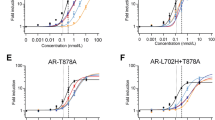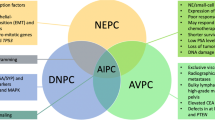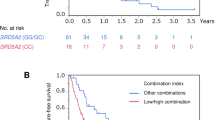Abstract
Androgen receptor stimulation by testosterone and dihydrotestosterone is crucial for prostate cancer progression. Despite the initial effectiveness of androgen deprivation therapy (ADT), castration-resistant prostate cancer eventually develops in most men. A common germline missense-encoding polymorphism in HSD3B1 increases extra-gonadal androgen biosynthesis from adrenal precursors owing to increased availability of the encoded enzyme 3β-hydroxysteroid dehydrogenase 1 (3βHSD1) — hence, it is called the adrenal-permissive enzyme. This mechanism explains the more rapid progression to castration-resistant prostate cancer in men who inherit this allele than in men without it via sustained androgen receptor activation despite ADT. Multiple clinical studies, including data derived from prospective phase III studies, have linked adrenal-permissive allele inheritance to inferior clinical responses to ADT and increased mortality, but reversal is possible with upfront adrenal androgen blockade. The adrenal-permissive allele exhibits divergent frequencies across various groups worldwide, which could contribute to differences in clinical outcomes among these populations. Large-scale data from the Million Veteran Program have shown homozygous HSD3B1 adrenal-permissive allele inheritance to be an independent biomarker of prostate cancer-specific mortality. Together, these observations support the integration of HSD3B1 into germline testing and clinical trials as it might help to identify groups at increased likelihood of benefiting from early, intensified, AR-_targeting interventions. Lastly, 3βHSD1 is a promising _target for pharmacological inhibition, which enables new strategies for systemic prostate cancer therapy.
This is a preview of subscription content, access via your institution
Access options
Access Nature and 54 other Nature Portfolio journals
Get Nature+, our best-value online-access subscription
24,99 € / 30 days
cancel any time
Subscribe to this journal
Receive 12 print issues and online access
We are sorry, but there is no personal subscription option available for your country.
Buy this article
- Purchase on SpringerLink
- Instant access to full article PDF
Prices may be subject to local taxes which are calculated during checkout

Similar content being viewed by others
References
Dai, C., Dehm, S. M. & Sharifi, N. _targeting the androgen signaling axis in prostate cancer. J. Clin. Oncol. 41, 4267–4278 (2023).
Sharifi, N. Minireview: androgen metabolism in castration-resistant prostate cancer. Mol. Endocrinol. 27, 708–714 (2013).
Dai, C. et al. Direct metabolic interrogation of dihydrotestosterone biosynthesis from adrenal precursors in primary prostatectomy tissues. Clin. Cancer Res. 23, 6351–6362 (2017).
Chang, K.-H. et al. Dihydrotestosterone synthesis bypasses testosterone to drive castration-resistant prostate cancer. Proc. Natl Acad. Sci. USA 108, 13728–13733 (2011).
Montgomery, R. B. et al. Maintenance of intratumoral androgens in metastatic prostate cancer: a mechanism for castration-resistant tumor growth. Cancer Res. 68, 4447–4454 (2008).
Geller, J. et al. DHT concentrations in human prostate cancer tissue. J. Clin. Endocrinol. Metab. 46, 440–444 (1978).
Titus, M. A., Schell, M. J., Lih, F. B., Tomer, K. B. & Mohler, J. L. Testosterone and dihydrotestosterone tissue levels in recurrent prostate cancer. Clin. Cancer Res. 11, 4653–4657 (2005).
Auchus, R. J. & Sharifi, N. Sex hormones and prostate cancer. Annu. Rev. Med. 71, 33–45 (2020).
Feldman, B. J. & Feldman, D. The development of androgen-independent prostate cancer. Nat. Rev. Cancer 1, 34–45 (2001).
Hettel, D. & Sharifi, N. HSD3B1 status as a biomarker of androgen deprivation resistance and implications for prostate cancer. Nat. Rev. Urol. 15, 191–196 (2018).
Hussain, M. et al. Metastatic hormone-sensitive prostate cancer and combination treatment outcomes: a review. JAMA Oncol. 10, 807–820 (2024).
Sabharwal, N. & Sharifi, N. HSD3B1 genotypes conferring adrenal-restrictive and adrenal-permissive phenotypes in prostate cancer and beyond. Endocrinology 160, 2180–2188 (2019).
Abida, W. et al. Genomic correlates of clinical outcome in advanced prostate cancer. Proc. Natl Acad. Sci. USA 116, 11428–11436 (2019).
Simard, J. et al. Molecular biology of the 3β-hydroxysteroid dehydrogenase/Δ5-Δ4 isomerase gene family. Endocr. Rev. 26, 525–582 (2005).
Evaul, K., Li, R., Papari-Zareei, M., Auchus, R. J. & Sharifi, N. 3β-Hydroxysteroid dehydrogenase is a possible pharmacological _target in the treatment of castration-resistant prostate cancer. Endocrinology 151, 3514–3520 (2010).
Chang, K. H. et al. A gain-of-function mutation in DHT synthesis in castration-resistant prostate cancer. Cell 154, 1074–1084 (2013).
Hearn, J. W. D. et al. HSD3B1 and resistance to androgen-deprivation therapy in prostate cancer: a retrospective, multicohort study. Lancet Oncol. 17, 1435–1444 (2016).
Locke, J. A. et al. Androgen levels increase by intratumoral de novo steroidogenesis during progression of castration-resistant prostate cancer. Cancer Res. 68, 6407–6415 (2008).
Thomas, L. & Sharifi, N. Germline HSD3B1 genetics and prostate cancer outcomes. Urology 145, 13–21 (2020).
Chang, K., Ercole, C. & Sharifi, N. Androgen metabolism in prostate cancer: from molecular mechanisms to clinical consequences. Br. J. Cancer 111, 1249–1254 (2014).
Hahn, A. W. et al. Germline variant in HSD3B1 (1245 A > C) and response to abiraterone acetate plus prednisone in men with new-onset metastatic castration-resistant prostate cancer. Clin. Genitourin. Cancer 16, 288–292 (2018).
Shiota, M. et al. Association of missense polymorphism in HSD3B1 with outcomes among men with prostate cancer treated with androgen-deprivation therapy or abiraterone. JAMA Netw. Open 2, e190115 (2019).
Khalaf, D. J. et al. HSD3B1 (1245A>C) germline variant and clinical outcomes in metastatic castration-resistant prostate cancer patients treated with abiraterone and enzalutamide: results from two prospective studies. Ann. Oncol. 31, 1186–1197 (2020).
Sharifi, N. Homozygous HSD3B1(1245C) inheritance and poor outcomes in metastatic castration-resistant prostate cancer with abiraterone or enzalutamide: what does it mean? Ann. Oncol. 31, 1103–1105 (2020).
Varenhorst, E. et al. Predictors of early androgen deprivation treatment failure in prostate cancer with bone metastases. Cancer Med. 5, 407–414 (2016).
Agarwal, N. et al. Independent validation of effect of HSD3B1 genotype on response to androgen-deprivation therapy in prostate cancer. JAMA Oncol. 3, 856–857 (2017).
Wu, G. et al. Variant allele of HSD3B1 increases progression to castration-resistant prostate cancer. Prostate 75, 777–782 (2015).
Borrell, L. N. et al. Race and genetic ancestry in medicine — a time for reckoning with racism. N. Engl. J. Med. 384, 474–480 (2021).
Hougen, H. Y. et al. Disparities in diagnosis, treatment access, and time to treatment among Hispanic men with metastatic prostate cancer. JCO Oncol. Pract. 19, 645–653 (2023).
Moul, J. W. Real-world analyses of mortality risk after androgen deprivation therapy initiation in Black vs. White patients with prostate cancer. J. Clin. Oncol. 42, 84–84 (2024).
Morgan, K. M. et al. Androgen deprivation therapy and outcomes after radiation therapy in black patients with prostate cancer. JAMA Netw. Open 7, e2415911 (2024).
Hearn, J. W. D. et al. Association of HSD3B1 genotype with response to androgen-deprivation therapy for biochemical recurrence after radiotherapy for localized prostate cancer. JAMA Oncol. 4, 558–562 (2018).
de Bono, J. S. et al. Abiraterone and increased survival in metastatic prostate cancer. N. Engl. J. Med. 364, 1995–2005 (2011).
Ryan, C. J. et al. Abiraterone in metastatic prostate cancer without previous chemotherapy. N. Engl. J. Med. 368, 138–148 (2012).
Scher, H. I. et al. Increased survival with enzalutamide in prostate cancer after chemotherapy. N. Engl. J. Med. 367, 1187–1197 (2012).
Beer, T. M. et al. Enzalutamide in metastatic prostate cancer before chemotherapy. N. Engl. J. Med. 371, 424–433 (2014).
Sharifi, N., McPhaul, M. J. & Auchus, R. J. “Getting from here to there”-mechanisms and limitations to the activation of the androgen receptor in castration-resistant prostate cancer. J. Investig. Med. 58, 938–944 (2010).
Naelitz, B. D. & Sharifi, N. Through the looking-glass: reevaluating DHEA metabolism through HSD3B1 genetics. Trends Endocrinol. Metab. 31, 680–690 (2020).
Almassi, N. et al. HSD3B1 and response to a nonsteroidal CYP17A1 inhibitor in castration-resistant prostate cancer. JAMA Oncol. 4, 554–557 (2018).
Li, Z. et al. Conversion of abiraterone to D4A drives anti-tumour activity in prostate cancer. Nature 523, 347–351 (2015).
Li, Z. et al. Redirecting abiraterone metabolism to biochemically fine tune prostate cancer anti-androgen therapy. Nature 533, 547–551 (2016).
Alyamani, M. et al. HSD3B1(1245A>C) variant regulates dueling abiraterone metabolite effects in prostate cancer. J. Clin. Invest. 128, 3333–3340 (2018).
Mei, Z. et al. Management of prostate cancer by _targeting 3βHSD1 after enzalutamide and abiraterone treatment. Cell Rep. Med. 3, 100608 (2022).
Lu, C. et al. Treatment with abiraterone and enzalutamide does not overcome poor outcome from metastatic castration-resistant prostate cancer in men with the germline homozygous HSD3B1 c.1245C genotype. Ann. Oncol. 31, 1178–1185 (2020).
Khalaf, D. J. et al. Optimal sequencing of enzalutamide and abiraterone acetate plus prednisone in metastatic castration-resistant prostate cancer: a multicentre, randomised, open-label, phase 2, crossover trial. Lancet Oncol. 20, 1730–1739 (2019).
Castro, E. et al. PROREPAIR-B: a prospective cohort study of the impact of germline DNA repair mutations on the outcomes of patients with metastatic castration-resistant prostate cancer. J. Clin. Oncol. 37, 490–503 (2019).
Hearn, J. W. D. et al. HSD3B1 genotype and clinical outcomes in metastatic castration-sensitive prostate cancer. JAMA Oncol. 6, e196496 (2020).
Sharifi, N. et al. HSD3B1 genotype and outcomes in metastatic hormone-sensitive prostate cancer with androgen deprivation therapy (ADT) and enzalutamide: (ARCHES). Cell Rep. Med. 5, 101644 (2024).
Sharifi, N. et al. Survival of men with metastatic hormone-sensitive prostate cancer and adrenal-permissive HSD3B1 inheritance. J. Clin. Invest. 134, e183583 (2024).
Sweeney, C. J. et al. Chemohormonal therapy in metastatic hormone-sensitive prostate cancer. N. Engl. J. Med. 373, 737–746 (2015).
Van der Eecken, K. et al. Tissue- and blood-derived genomic biomarkers for metastatic hormone-sensitive prostate cancer: a systematic review. Eur. Urol. Oncol. 4, 914–923 (2021).
Armstrong, A. J. et al. ARCHES: a randomized, phase III study of androgen deprivation therapy with enzalutamide or placebo in men with metastatic hormone-sensitive prostate cancer. J. Clin. Oncol. 37, 2974–2986 (2019).
Sweeney, C. J. et al. Testosterone suppression plus enzalutamide versus testosterone suppression plus standard antiandrogen therapy for metastatic hormone-sensitive prostate cancer (ENZAMET): an international, open-label, randomised, phase 3 trial. Lancet Oncol. 24, 323–334 (2023).
McKay, R. R. et al. Adrenal-permissive germline HSD3B1 allele and prostate cancer outcomes. JAMA Netw. Open 7, e242976 (2024).
Schiffer, L. & Sharifi, N. Adrenal-permissive HSD3B1 genotype-an invisible stimulator of prostate cancer mortality. JAMA Netw. Open 7, e243402 (2024).
Castro, E. et al. Germline BRCA mutations are associated with higher risk of nodal involvement, distant metastasis, and poor survival outcomes in prostate cancer. J. Clin. Oncol. 31, 1748–1757 (2013).
Marar, M. et al. Outcomes among African American and non-hispanic white men with metastatic castration-resistant prostate cancer with first-line abiraterone. JAMA Netw. Open 5, e2142093 (2022).
George, D. J. et al. Survival by race in men with chemotherapy-naive enzalutamide- or abiraterone-treated metastatic castration-resistant prostate cancer. Prostate Cancer Prostatic Dis. 25, 524–530 (2022).
Dess, R. T. et al. Association of black race with prostate cancer-specific and other-cause mortality. JAMA Oncol. 5, 975–983 (2019).
Dorff, T. et al. Prostate cancer characteristics and outcomes after prostatectomy in Asian-American men. Clin. Genitourin. Cancer 20, 92–92.e96 (2022).
Bernard, B. et al. Impact of ethnicity on the outcome of men with metastatic, hormone-sensitive prostate cancer. Cancer 123, 1536–1544 (2017).
Ganguly, S. et al. Intratumoral androgen biosynthesis associated with 3β-hydroxysteroid dehydrogenase 1 promotes resistance to radiotherapy in prostate cancer. J. Clin. Invest. 133, e165718 (2023).
Sharifi, N. et al. Survival of men with metastatic hormone sensitive prostate cancer and adrenal-permissive HSD3B1 inheritance. J. Clin. Invest. 134, e183583 (2024).
Li, X. et al. BMX controls 3βHSD1 and sex steroid biosynthesis in cancer. J. Clin. Invest. 133, e163498 (2023).
Dai, B. et al. Compensatory upregulation of tyrosine kinase Etk/BMX in response to androgen deprivation promotes castration-resistant growth of prostate cancer cells. Cancer Res. 70, 5587–5596 (2010).
Chen, S. et al. BMX-mediated regulation of multiple tyrosine kinases contributes to castration resistance in prostate cancer. Cancer Res. 78, 5203–5215 (2018).
Qiu, Y. A phosphorylation switch controls androgen biosynthesis in prostate cancer. J. Clin. Invest. 133, e166499 (2023).
Alu, A., Lei, H., Han, X., Wei, Y. & Wei, X. BTK inhibitors in the treatment of hematological malignancies and inflammatory diseases: mechanisms and clinical studies. J. Hematol. Oncol. 15, 138 (2022).
Montoya, S. et al. Kinase-impaired BTK mutations are susceptible to clinical-stage BTK and IKZF1/3 degrader NX-2127. Science 383, eadi5798 (2024).
McKay, R. R. et al. The Maverick trial: a phase 2 study of abivertinib in patients (pts) with metastatic castration resistant prostate cancer (mCRPC). J. Clin. Oncol. 41, TPS5106 (2023).
Shiota, M. et al. Importance of 3β-hydroxysteroid dehydrogenases and their clinical use in prostate cancer. Endocr. Relat. Cancer 31, e240023 (2024).
Acknowledgements
This work was supported in part by grants from NCI, NIH (R01CA172382, R01CA236780, R01CA261995 and R01CA249279). N.S. is a co-inventor on a Cleveland Clinic patent on HSD3B1.
Author information
Authors and Affiliations
Contributions
P.F.S.F., A.A., R.R.M. and N.S. researched data for the article. All authors contributed substantially to discussion of the content, wrote the article and/or edited the manuscript before submission.
Corresponding author
Ethics declarations
Competing interests
N.S. is a co-inventor on patents related to HSD3B1 filed by his former employer, Cleveland Clinic. The other authors declare no competing interests.
Peer review
Peer review information
Nature Reviews Urology thanks Masaki Shiota, Alex Wyatt for their contribution to the peer review of this work.
Additional information
Publisher’s note Springer Nature remains neutral with regard to jurisdictional claims in published maps and institutional affiliations.
Rights and permissions
Springer Nature or its licensor (e.g. a society or other partner) holds exclusive rights to this article under a publishing agreement with the author(s) or other rightsholder(s); author self-archiving of the accepted manuscript version of this article is solely governed by the terms of such publishing agreement and applicable law.
About this article
Cite this article
Freitas, P.F.S., Abdshah, A., McKay, R.R. et al. HSD3B1, prostate cancer mortality and modifiable outcomes. Nat Rev Urol (2024). https://doi.org/10.1038/s41585-024-00953-0
Accepted:
Published:
DOI: https://doi.org/10.1038/s41585-024-00953-0



